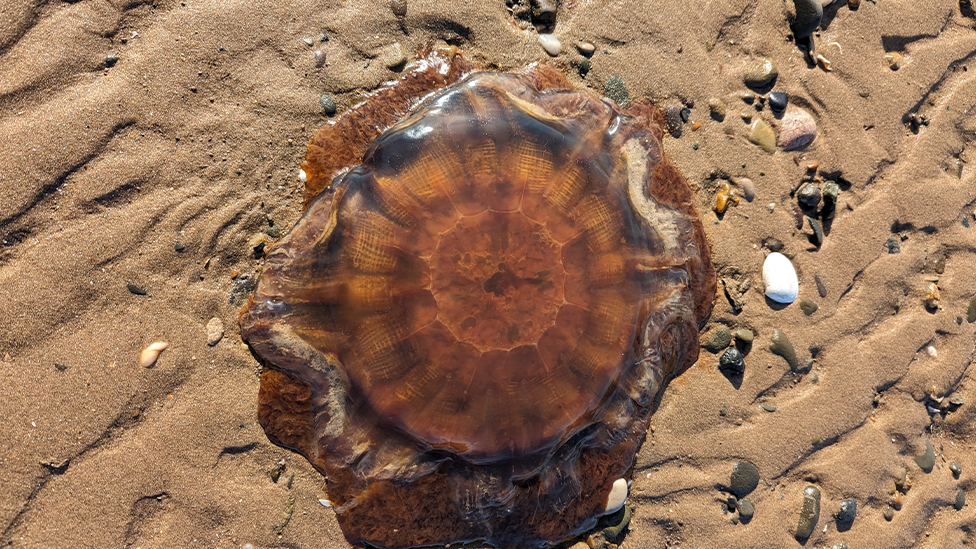Jellyfish warning after dog gets violently ill

Ziggy the coltriever at Talacre beach in Denbighshire where he became violently sick from a dead jelly fish
At a glance
Dog walker warns about dangers of jellyfish after her dog becomes violently ill during a beach walk
Hilary Pullen from Prestatyn in Denbighshire says her coltriever started "retching" after brief contact with a dead jellyfish
She identified it as a stinging Lion's mane jellyfish, a common UK species
Marine Conservation Society says preliminary data indicates a "bumper year" for jellyfish sightings
- Published
A dog walker has warned about the dangers jellyfish can pose after her pet became violently ill during a beach walk.
Hilary Pullen, 45, from Prestatyn in Denbighshire, said her dog Ziggy started "retching" after brief contact with a dead jellyfish.
She identified it as a Lion's mane jellyfish, which can cause painful stings.
Hilary said her dog had recovered, but she is now avoiding Talacre beach where she has seen a lot of jellyfish this summer.

A picture of the dead jellyfish helped to identify it as a Lion's mane
"I was just having a closer look at the jellyfish because they are so fascinating," she recalled.
But then her 18-month-old coltriever (a border collie and retriever mix) ran back to her "before I could say, 'get off it'."
"He had his face on the jellyfish," she said. "I'm not sure if he put his nose on it or licked it, but within in 20 to 30 seconds he was retching.
"I've never seen him so distressed before," she added, explaining how he started gasping for breath and tried to eat plants on the edge of the beach.
Hunting for the northern lights of the ocean
- Published25 June 2023
Giant jellyfish washes up on beach
- Published30 June 2022
Portuguese man o' war warning after Devon sighting
- Published15 February 2022
She dragged him back to her car and was able to get him home, but Ziggy remained in a lot of pain.
"He went into the garden and was manically eating grass," she said. "It was so weird something I've never seen before in dogs. I guess he wanted to get something into his stomach."
She fed him a bowl of rice and eggs and rang the veterinarian.
"They said as long as he was still breathing okay I didn't have to bring him in, but it was difficult watching him suffering."

Hilary and Ziggy on a camping trip in Eryri, also known as Snowdon
Hilary went online to find out the type of jellyfish she had seen and get advice on what to do.
"I found comments about some people giving their dog a small amount of Piriton, an antihistamine," she said. "I gave him half a tab and within an hour he was better."
For now, Hilary said she and Ziggy will be staying away from their regular beach walks.
She said she has noticed more jellyfish this summer and wonders if it has to do with warmer than normal sea temperatures off the UK this summer.

Lion's mane jellyfish are common in UK waters and use their stinging tentacles to catch prey
Dr Angus Jackson from the Marine Conservation Society said preliminary data from a citizen sighting programme, external suggest it will be a "bumper year" for jellyfish in Wales.
"Of the species found in UK waters, most of them are harmless to humans," he added. "One or two species do have a painful sting though, so we'd urge you to avoid touching them.
"Even if they are washed up dead on the beach, they can still give a nasty sting."
Do not give medication
RSPCA Cymru called incidents like the one Ziggy experienced "distressing" but "thankfully rare".
A spokesperson urged people who walk their dogs on the beach to be vigilant.
"Dogs are naturally curious," they said. "So if you see a jellyfish or a tentacle washed up on the beach make sure that your dog does not go near it."
The RSPCA said dog owners who think their pet has been stung should seek veterinary treatment right away and not administer any medication unless advised to do so by a veterinarian.
- Published27 July 2023

- Published21 September 2020

- Published4 August 2023
